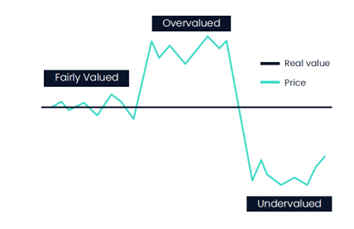- News
- Investing

At a glance
- Fundamental valuations are key enablers for investors to capitalise on market inefficiencies and exploit mispricing, generating potential superior risk-adjusted returns.
- SJP House View updated from "muddling through" to a soft landing; elections will likely keep uncertainty high, especially on fiscal policy.
- Practising patience and discipline ensures that we only act upon opportunities when valuations are at extreme levels.
After a mostly strong quarter in the US equity market, equity valuations remain mixed across regions, with the global average skewed to look expensive by the Magnificent 7 in the US. We had seen a brief uptick in crypto-related asset values earlier in the quarter with the approval of several crypto ETFs, but that quickly subsided. Despite the availability of significantly higher yields compared to recent history, credit spreads are slightly below their long-term averages.
SJP House View
The US economy has continued performing well, and recession risks have receded. As such, we have updated our base case to "soft landing", a positive change from "muddling through".
We are still in a late cycle in the US and floating close to a technical recession in Europe, with the UK in a technical recession. Investing in a late cycle is always difficult. Historically, risky assets performed well in this period; however, volatility can increase as markets assess the likelihood of a recession. We have a neutral view on equity risk but a bias away from richly valued US assets.
A key tail risk we continue to see as problematic is the gap between the US deficit and the unemployment rate, which risks heightened bond market volatility. With many investors pouring into bonds—particularly High-Yield bonds—attracted to the higher yields, we no longer believe this asset class offers as attractive valuations as it did previously. Thus, we have updated our asset allocation view to neutral.
Lower inflation in emerging markets and the US rate cuts should continue to support overall emerging market growth. However, it is nuanced within emerging markets. We are observing investors starting to view India's valuation as "expensive", and outflows have been seen from India to China. While China's economic recovery is difficult to call, China is adding stimulus and focusing on high-end tech and Artificial Intelligence.
Chinese corporate profits are starting to grow more quickly than the cost of money, implying a potential profit boom. Although the macro picture in China is unpromising, the steep fall in Chinese equities has pushed the local equity risk premium above the trend.
Don't believe the hype. It's the valuations that matter.
Skimming today's newspapers or scrolling through social media, you're bound to encounter headlines or pundits promoting the latest investment promising high returns. It's essential to recognise that such offers, compelling though they may appear, often play on our FOMO - "fear of missing out", nudging us towards following new trends or doubting our own investment choices. Cryptocurrencies are emblematic of this. While some investors have experienced meteoric gains, the extreme volatility and risk of total capital loss make them feel highly speculative. Diving into something like this without understanding the underlying valuations or potential volatility feels like rolling the dice. So, much depends on market whims.
We don't speculate. We evaluate.
Valuations represent how much a company or asset should realistically be priced in the market. By understanding this, we can determine if the current price is high or low and decide whether to buy, sell, or hold. Our process will identify extremes in valuations, but we always remain disciplined about the opportunities we invest in and those we choose to ignore.
For our portfolios, we concentrate on the valuations of broader categories like sectors, regions, or entire asset classes. This wide-angle view allows us to identify whole areas of the market that have deviated from their true value and exploit any potential mispricing opportunities.
For example, when stock market valuations have risen sharply, equities, or company shares, can become relatively less attractive compared to other asset classes. In this situation, we may recommend adjusting our portfolios to increase exposure to assets with more favourable valuations, such as bonds or alternative investments.
By dialling up or down the weightings of asset classes based on their valuations, we can respond to changing market conditions. This medium-term asset allocation process is where new investment opportunities can be found and where portfolio risk is managed. However, it's important to effectively apply our in-depth analysis and market knowledge to construct resilient portfolios.
 |
When an asset class presents an extreme valuation - that is, when it is significantly undervalued or overvalued relative to its historical norms - we will consider increasing or decreasing our investment in that area. |
Patience is not just a virtue
Historically, investment strategies that prioritise valuations have been shown to outperform speculative approaches over five years or more.
However, attractive valuations are only sometimes evident from the outset; it often takes skills and considerable time for the market to realise it.
This is why being patient is so important. It means taking steps to avoid the pitfalls of acting on gut instincts. Patience enables our team to keep biases in check and hold a medium-term view. It also helps to stay focused on the basics, like whether an area of the market is overvalued or undervalued.
We're bracing ourselves for more distractions this year. Amongst the noise, pre-election manoeuvres and manifesto pledges may spark speculation around which stocks or asset classes will come out on top. Staying patient and making disciplined decisions based on sound analysis, like valuations, will be more important than ever.
In Buffet's words, "the stock market is a device for transferring money from the impatient to the patient."
Past performance is not indicative of future results.
The value of an investment with St. James's Place will be directly linked to the performance of the funds selected and may fall as well as rise. You may get back less than the amount invested.
Most recent articles


